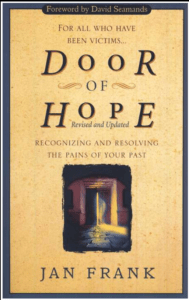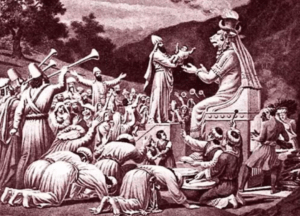
In this lesson we will look at some of the more common obstacles to receiving the baptism in the Spirit that we may encounter and how to overcome them.
For the LORD of hosts has purposed, and who will annul it? His hand is stretched out, and who will turn it back? Isaiah 14:27 (ESV)
 Satan is not in the least comparable to God in power or authority. From the beginning of his rebellion, our adversary’s cause has been doomed, but his activities are not without consequence to us. Satan has influenced countless millions to join his revolt against God, increasing the population of hell and the misery of humankind. He works incessantly to block people from receiving the new birth, to hinder followers of Christ from experiencing all that Christ died to give them, and to prevent them from becoming witnesses and disciplemakers.
Satan is not in the least comparable to God in power or authority. From the beginning of his rebellion, our adversary’s cause has been doomed, but his activities are not without consequence to us. Satan has influenced countless millions to join his revolt against God, increasing the population of hell and the misery of humankind. He works incessantly to block people from receiving the new birth, to hinder followers of Christ from experiencing all that Christ died to give them, and to prevent them from becoming witnesses and disciplemakers.
While Satan cannot block God’s blessings, he does deceive us into erecting our own obstacles, which must be overcome or removed.
Just as Balaam, the false prophet, could not curse those whom God had blessed (Numbers 23:8), neither can Satan.
God is not a man, that He should lie, Nor a son of man, that He should repent; Has He said, and will He not do it? Or has He spoken, and will He not make it good? 20 “Behold, I have received a command to bless; When He has blessed, then I cannot revoke it. Numbers 23:19–20 (NASB95) —
However, Balaam slyly and indirectly cursed Israel by influencing them to sin against God, bringing the Lord’s judgment upon the nation.
Behold, these caused the sons of Israel, through the counsel of Balaam, to trespass against the Lord in the matter of Peor, so the plague was among the congregation of the Lord. Numbers 31:16 (NASB95) —
In like manner Satan tempts us to sin and doubt God’s promises to hinder us from experiencing God’s blessings to their fullest. Below are some of the more common obstacles or hindrances to receiving God’s blessings and how to overcome them.
Ignorance
People often resist what they do not know or understand.
The devil sows his lies into the fertile soil of our ignorance where they can germinate into resistance against God and his promises.
Hosea 4:6 states that God’s people are destroyed for lack of knowledge. Ignorance is never a good thing, except when it comes to evil. Overcoming ignorance requires work. God wants us to be like those in Berea when they first heard Paul preach the gospel. Even though Paul’s words were contrary to some of their Jewish traditions, the Berean audience carefully considered what he said in light of the Bible’s teachings.
Now these were more noble-minded than those in Thessalonica, for they received the word with great eagerness, examining the Scriptures daily to see whether these things were so. 12 Therefore many of them believed, along with a number of prominent Greek women and men. Acts 17:11-12 (NASB)
To overcome the obstacle of ignorance, we must apply ourselves to study the scriptures and believe what they tell us, regardless of what we may have been taught previously.
We cannot afford to remain ignorant of God’s truth!
With regard to spiritual gifts, brothers and sisters, I do not want you to be uninformed. 1 Corinthians 12:1 (NET)
If we want to know the truth about the baptism in the Spirit, it is up to us to search for it in the Bible rather than simply rely upon what others say. We can safely trust the Holy Spirit to be our guide. If this doctrine is truly of God, he will make it plain to us.
But when He, the Spirit of truth, comes, He will guide you into all the truth; for He will not speak on His own initiative, but whatever He hears, He will speak; and He will disclose to you what is to come. John 16:13 (NASB)
Fear
Fear is often a subset of ignorance. We often fear and reject what is new, different, or we do not understand. Truth wins in the end. Today many are afraid of the baptism and gifts of the Spirit because they are unfamiliar and strange to them. Their church leaders may have never taught them about these things or, even more sadly, may have taught error based on man-made theology and church traditions.
Often following Jesus requires us to confront our fears. We can trust him to guide us into a place of safety if we follow him with simplicity and faith.
Do not be afraid, little flock, for your Father has chosen gladly to give you the kingdom. Luke 12:32 (NASB95) —
Jesus threatened the Pharisees’ iron grip on the people by teaching them how to connect with a loving Abba Father who did not require them to adhere to dead religion. The Pharisees’ expectation of the role of the Messiah did not mesh with who Jesus really was and is. Rather than adjust their beliefs to Jesus’ explanation of the meaning of scripture, they dug more deeply into their doctrinal position. They feared, rejected, and hated him, eventually putting him to death to preserve their position of power. Satan had effectively united them to his cause. They became Christ’s worst enemies by steadfastly resisting truth and the Spirit of God’s testimony.
But one of them, Caiaphas, who was high priest that year, said to them, “You know nothing at all, 50 nor do you take into account that it is expedient for you that one man die for the people, and that the whole nation not perish.” John 11:49–50 (NASB95) —
Satan always resists the advancement of truth and God’s Spirit because it threatens his tyrannical grip on people. He instills that fear into those whom he can influence.
Satan cannot stop God from blessing you, but our fear and unbelief can restrict our experience of him.
Legalism
Legalism is a man-made attempt to gain or maintain a right standing with God through our own efforts instead of believing and receiving what Jesus did for us. We can begin our spiritual journey by relying on grace but slide into legalism along the way.
How foolish can you be? After starting your new lives in the Spirit, why are you now trying to become perfect by your own human effort? Galatians 3:3 (NLT) —
Regarding the baptism of the Spirit, legalism reveals itself when we think that we are not yet good or holy enough to receive this remarkable gift.
We may think that we must clean up our lives or overcome some sin first. It may be that we do need to repent of a sin prior to receiving from God, but that can be done instantly. Legalism wants us to delay things until we feel that we are good enough. That will never happen. We will never be good enough on our own to deserve God’s blessings.
Jesus made us worthy to receive all of God’s blessings.
The baptism in the Spirit is designed to be one of the first experiences a new believer has with God. The Holy Spirit comes into our lives to make us more like Jesus. He will take care of remaking us in Christ’s image, which is a lifelong endeavor. First things first! Now simply receive God’s blessings. Later we can cooperate with the Spirit in the transformation process. Now we simply need to open our hearts to God and receive his blessings by faith.
The only thing I want to learn from you is this: Did you receive the Spirit by doing the works of the law or by believing what you heard? Galatians 3:2 (NET)
Traditions of Men
Most, if not all, religious groups tend to form their own culture and traditions over time. Non-denominational churches often begin as a protest against dead formality and ritual, but over the years such churches develop their own set ways of doing things. This is part of what it means to be human and is not necessarily a bad thing.
However, if our traditions stand between us and the apprehension of the truth and our reception of God’s promises, they are evil and must be set aside.
Jesus confronted dead religious traditions quite often, thereby incurring the wrath of the establishment. Once traditions are set, they tend to assume a stature as if God himself set them up. Some churches, such as Roman Catholicism, are upfront about it by officially elevating church tradition to the status of scripture. Evangelical churches would never openly say such a thing, but we sometimes put our traditional interpretation of Scripture over truth.
Those steeped in the traditions of men prefer the old and established way of doing things over any new revelation from the Spirit.
That is one reason it is often easier to disciple an unbeliever than a long-time church goer. There is less to unlearn.
Jesus warned against following any traditions that nullify the clear intent of God’s Word.
And He answered and said to them, "Why do you yourselves transgress the commandment of God for the sake of your tradition? 4 "For God said, 'HONOR YOUR FATHER AND MOTHER,' and, 'HE WHO SPEAKS EVIL OF FATHER OR MOTHER IS TO BE PUT TO DEATH.' 5 "But you say, 'Whoever says to his father or mother, "Whatever I have that would help you has been given to God," 6 he is not to honor his father or his mother.' And by this you invalidated the word of God for the sake of your tradition. 7 "You hypocrites, rightly did Isaiah prophesy of you: 8 'THIS PEOPLE HONORS ME WITH THEIR LIPS, BUT THEIR HEART IS FAR AWAY FROM ME. 9 'BUT IN VAIN DO THEY WORSHIP ME, TEACHING AS DOCTRINES THE PRECEPTS OF MEN.'" Matthew 15:3-9 (NASB)
When it comes to the baptism in the Holy Spirit, the only thing that matters is what the scriptures say, not what our church traditions may teach. Just as in Jesus’ day, sometimes it requires great courage on our part to resist and overcome time honored traditions to serve the Lord.
Passivity
There is a time for “waiting upon God,” which describes our having the attitude of being surrendered to God’s will for our lives and waiting for him to clarify what he wants us to do. Waiting on God shows that we grasp the danger of operating independently from the leadership of the Holy Spirit.
However, once we know what his will for us is and are confident that now is the time for us to act, passivity becomes a sin.
Nothing substitutes for acting in faith, not even prayer or worship. If our mothers asked us to clean our rooms when we were young children, they would not be happy to find out we never did it because we were praying instead. There is a time for every purpose under heaven.
Jesus instructed his first disciples to wait for the promise of the Father, the baptism in the Spirit, but this was because their first experience of this extraordinary gift from God had to take place on the exact day of Pentecost, perfectly fulfilling God’s eternal purpose for that Old Covenant feast.
“And now I will send the Holy Spirit, just as my Father promised. But stay here in the city until the Holy Spirit comes and fills you with power from heaven.” Luke 24:49 (NLT) —
They waited and prayed for days in the upper room, but when the day of Pentecost finally arrived, the Spirit was powerfully poured out on them.
Since then, every day is Pentecost. There is no longer any need to wait. We can receive the baptism in the Spirit instantly by faith.
In addition, we should not expect the Holy Spirit to somehow take control of us, as if God superimposes himself over our desires and will. In his goodness and love, God expects and encourages us to partner with him. The Spirit, who dwells within us, also comes alongside us allowing us to participate with him in ministry. He lets us know the things that God has freely given to us, which includes the baptism in the Holy Spirit. (1 Corinthians 2:12)
Our role is to ask for and receive God’s blessings.
If we do not ask, why should we expect to receive? If we have asked, what is stopping us from actively receiving?
It is true that sometimes God blesses those who do not seek or ask, but almost always he wants our participation, especially when we know the truth. Therefore, we should not be passive when it comes to the baptism in the Spirit. Faith acts as if God’s Word is true… because it is.
Ask, and it will be given to you; seek, and you will find; knock, and it will be opened to you. 8 "For everyone who asks receives, and he who seeks finds, and to him who knocks it will be opened. Matthew 7:7-8 (NASB)
The Occult
If we have ever been an occult practitioner of any sort, consulted such a person, or even dabbled in occult activities that we thought were harmless, such as a Ouija board, we should take the necessary steps to extricate ourselves from the devil’s trap.
… I do not want you to be partners with demons. 1 Corinthians 10:20b (NET)
 In his first letter to the church in Corinth, Paul warned those early disciples not to participate with demons in any way. In the modern world many do not even believe that such malevolent beings exist, but anyone who takes the Bible seriously cannot dismiss them. The Bible does not tell us much about their origin, but we do know that they are evil spirits which desire to inhabit human bodies and oppress anyone they can.
In his first letter to the church in Corinth, Paul warned those early disciples not to participate with demons in any way. In the modern world many do not even believe that such malevolent beings exist, but anyone who takes the Bible seriously cannot dismiss them. The Bible does not tell us much about their origin, but we do know that they are evil spirits which desire to inhabit human bodies and oppress anyone they can.
The Greek word that describes the activity of demons is “daimonidzomai,” which simply means to demonize. Some translators of the Bible unfortunately used the English word “possess,” which carries all altogether different meaning of ownership and complete control. Using this poor translation as their basis, some argue that it is impossible for Christians, who belong to God and in whom dwells the Holy Spirit, to be possessed, owned, or completely taken over by an evil spirit. I agree wholeheartedly with that logic, but I insist that it is possible for believers in Christ to be demonized or oppressed by evil spirits. I have seen too many examples to think otherwise. Believers in Christ belong to God but can be oppressed by the devil.
Oppression can take many forms, ranging from mild to severe.
While demons, or anything or anyone else for that matter, cannot block the Holy Spirit, in his kindness and wisdom God may require us to properly distance ourselves from the demonic before he allows us to move forward with him.
God is properly “jealous” in the sense that he refuses to “cohabit” with evil.
You unfaithful people! Don't you know that love for this {evil} world is hatred toward God? Whoever wants to be a friend of this world is an enemy of God. 5 Do you think this passage means nothing? It says, “The Spirit that lives in us wants us to be his own.” James 4:4-5 (GW)
Demons do not care how they gain access to people. They will take advantage of any doors we open to them, even when we do it unknowingly. In fact, innocent people are often exposed to demonization by the actions of others, as in the case when adults introduce young children to sin, especially sexual sin and occult practices, such as witchcraft.
Why is occult involvement such a hindrance? I suppose it is because through it we open ourselves up to Satan’s power when we involve ourselves in his world. God will not tolerate demons to inhabit our bodies, which were created to house the Holy Spirit.
Or do you not know that your body is a temple of the Holy Spirit who is in you, whom you have from God, and that you are not your own? 20 For you have been bought with a price: therefore glorify God in your body. 1 Corinthians 6:19–20 (NASB95) —
It is an affront to God when we turn to demons for knowledge or help, instead of relying upon him.
This is one reason God expressly forbids any attempt to contact the dead or Satan’s realm to gain knowledge or power. Not only does it expose us to demonic oppression, but it opens a door for lies to control us.
Martha and I were once ministering to a young woman who was not able to get a breakthrough when it came to speaking in tongues, even though she had repeatedly asked to receive the baptism in the Spirit. I asked her if she had ever been involved in the occult. She replied that she formerly had practiced witchcraft. I then inquired if she had ever renounced that, and she said, no. She did not know that she even needed to do so. The Bible says that…
He who conceals his transgressions will not prosper, But he who confesses and forsakes them will find compassion. Proverbs 28:13 (NASB)
We led her in a prayer of repentance in which she renounced her past involvement with witchcraft. Immediately she told us that she felt as if an anvil were pressing down upon her chest. Suddenly the pressure lifted, and she began speaking in tongues. God waited for her to confess the sin and get rid of the demon, which had been oppressing her for years without her knowledge, before he gave her his marvelous gift.
What a blessing that God withheld something good until she took steps to rid herself of something bad!
Some of the occult activities we may need to renounce include the following: seances, Ouija board, fortune telling, tarot cards, witchcraft, astrology, etc. If we have in any way dabbled or immersed ourselves in anything connected with the kingdom of darkness, we should repent and verbally renounce those things and ask for and receive God’s forgiveness through Christ’s blood. Then we can command any attached spirits of darkness to depart in Jesus’ name. They must obey that command. We carry Christ’s authority which is backed up by the power of God’s Holy Spirit. We speak the words of authority and faith, and the Spirit of God enforces them.
It is vital that we understand and believe that evil spirits have no option but to obey a command to leave when we properly repent and use Christ’s authority. We need never find ourselves in a power struggle with a demon. It is always a truth and authority issue. Their power was destroyed at Calvary when Jesus rose from the dead.
In this way, he disarmed the spiritual rulers and authorities. He shamed them publicly by his victory over them on the cross. Colossians 2:15 (NLT)
Once we remove any “platform” or “hook” a demon may have used to oppress us through repentance and renouncing, it is an easy matter to break their grip using the authority of Christ. The Holy Spirit is the Enforcer of Christ’s victory and his authority. He comes to our aid when we do our part.
Once we properly distance ourselves from the occult, we will be ready to receive the baptism and fullness of the Holy Spirit.
Bitterness
Nothing undercuts our life of grace and faith more than bitterness. The only way any of us can stand before God is because Abba Father forgave our sins based on Jesus’ taking the rap for us by paying the ultimate penalty of death. When we refuse to forgive others, in effect we reject what God did for us, showing that we believe that our standard of righteousness is even higher than God’s. He may be able to forgive, but we cannot. This is the height of pride and deception and grieves God’s heart.
When we nurse offenses, we are bound in a prison of our own making until we liberate ourselves by choosing to forgive those who have hurt us.
Jesus taught that when we refuse to forgive, God will turn us over to “tormentors,” so that we can learn to forgive. In his parable of the unforgiving servant, Jesus said:
"Then summoning him, his lord *said to him, 'You wicked slave, I forgave you all that debt because you pleaded with me. 33 'Should you not also have had mercy on your fellow slave, in the same way that I had mercy on you?' 34 "And his lord, moved with anger, handed him over to the torturers until he should repay all that was owed him. 35 "My heavenly Father will also do the same to you, if each of you does not forgive his brother from your heart." Matthew 18:32-35 (NASB)
Once we suffer for a while, hopefully we will decide that holding onto our bitterness is not worth the price.
I have found that when we are bitter, we have a difficult time receiving anything from God.
We usually cannot hear his voice because our hearts are hard. Hardness of heart is the scariest thing that happen to anyone, and bitterness is a sure sign that we have that condition. Only tenderhearted people can forgive and receive from God.
Let all bitterness and wrath and anger and clamor and slander be put away from you, along with all malice. 32 Be kind to one another, tender-hearted, forgiving each other, just as God in Christ also has forgiven you. Ephesians 4:31-32 (NASB)
If we harbor bitterness of any kind, it is paramount that we release those who have offended us, so that we can be free to receive all that God has given to us.
Ask the Holy Spirit to reveal anyone we need to forgive. If anyone comes to mind, we should say out loud that we release them from owing us anything and ask God to wash us clean from all traces of unforgiveness. We let go of the debt. Now they are accountable only to God and we are free. If appropriate, we may need to meet with them later to reconcile.
Wrong Motives
The last obstacle we may need to overcome has to do with wrong motives, such as ambition, pride, and the love of money. James wrote the following warning.
You ask and do not receive, because you ask with wrong motives, so that you may spend it on your pleasures. James 4:3 (NASB)
God blesses us with the baptism in the Spirit to equip and empower us to be his witnesses. If we are seeking this gift for a less than honorable reason, he may withhold this amazing blessing for our own good until we repent. God gave us an example of this in the book of Acts.
Now when Simon saw that the Spirit was given through the laying on of the apostles’ hands, he offered them money, 19 saying, “Give me this power also, so that anyone on whom I lay my hands may receive the Holy Spirit.” 20 But Peter said to him, “May your silver perish with you, because you thought you could obtain the gift of God with money! 21 You have neither part nor lot in this matter, for your heart is not right before God. Acts 8:18-21 (ESV)
I have occasionally encountered people with issues that God insisted they get right before receiving the baptism in the Spirit, but it is not the norm.
If the Holy Spirit is speaking to your heart that you need to get something right with him, please listen and do what he says.
Conclusion
Now that we have identified and hopefully overcome some of the major obstacles to receiving God’s blessings, we are ready to receive the baptism in the Holy Spirit, which will be the topic of the next chapters.
Questions for Further Study and Discussion
- Which obstacle seems to be the most significant to you?
- Has this teaching helped you regarding any particular obstacle?
 Want to know more? I have written a book on this very topic, which is available on Amazon. Click here to find out more.
Want to know more? I have written a book on this very topic, which is available on Amazon. Click here to find out more.




 Satan is not in the least comparable to God in power or authority. From the beginning of his rebellion, our adversary’s cause has been doomed, but his activities are not without consequence to us. Satan has influenced countless millions to join his revolt against God, increasing the population of hell and the misery of humankind. He works incessantly to block people from receiving the new birth, to hinder followers of Christ from experiencing all that Christ died to give them, and to prevent them from becoming witnesses and disciplemakers.
Satan is not in the least comparable to God in power or authority. From the beginning of his rebellion, our adversary’s cause has been doomed, but his activities are not without consequence to us. Satan has influenced countless millions to join his revolt against God, increasing the population of hell and the misery of humankind. He works incessantly to block people from receiving the new birth, to hinder followers of Christ from experiencing all that Christ died to give them, and to prevent them from becoming witnesses and disciplemakers. In his first letter to the church in Corinth, Paul warned those early disciples not to participate with demons in any way. In the modern world many do not even believe that such malevolent beings exist, but anyone who takes the Bible seriously cannot dismiss them. The Bible does not tell us much about their origin, but we do know that they are evil spirits which desire to inhabit human bodies and oppress anyone they can.
In his first letter to the church in Corinth, Paul warned those early disciples not to participate with demons in any way. In the modern world many do not even believe that such malevolent beings exist, but anyone who takes the Bible seriously cannot dismiss them. The Bible does not tell us much about their origin, but we do know that they are evil spirits which desire to inhabit human bodies and oppress anyone they can. Want to know more? I have written a book on this very topic, which is available on Amazon.
Want to know more? I have written a book on this very topic, which is available on Amazon. 






